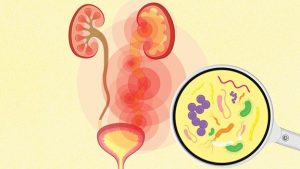Have you been diagnosed with fibroids and now have a million questions running through your mind?
You are at the right place! In this blog post, we want to dispel some of the most common fibroid myths and provide you with facts backed by medical research and my own experience. Are you ready to separate fibroid fiction from fact?
Let’s dive in and uncover the truth about these common uterine tumors.

Are Fibroids Cancerous? The Truth Behind This Common Myth
This is one of the biggest myths out there, and it’s simply not true. Fibroids are non-cancerous growths in the uterus made up of muscle and fibrous tissue. While the exact cause is unknown, genetics and hormones are believed to play a role.
Many women have fibroids at some point, but they are rarely life-threatening. Still, they can cause unpleasant symptoms like heavy bleeding, pain, and fertility issues. The good news is there are several treatment options available depending on your symptoms and plans to get pregnant.
Some women can effectively manage symptoms with over-the-counter pain relievers and hormonal birth control. Others may need procedures like uterine fibroid embolization to cut off the blood supply to fibroids or surgery to remove them. Hysterectomy, the removal of the uterus, is only recommended in severe cases.
The bottom line is that fibroids are extremely common and typically benign. While they can negatively impact your quality of life if left untreated, the risks of them becoming cancerous are negligible. The best way to determine the right course of action is through regular pelvic exams, ultrasounds, and open communication with your doctor.
No doubt, with the right diagnosis and treatment, you can find relief from fibroid discomfort and take back control of your health. Don’t let myths and misconceptions prevent you from seeking the care you need. The truth shall set you free!
Do Fibroids Grow Back After Removal? Facts vs. Fiction
Do fibroids grow back after removal?
It’s a common myth, but the truth is more complicated. While fibroids are benign tumors, that doesn’t mean they won’t return after treatment. However, the likelihood depends on the specific procedure.
According to the studies, with a myomectomy, where only the fibroids themselves are removed, there is a 15-33% chance of recurrence. The younger you are, the higher the risk. Why? Because you have more years of potential estrogen exposure, which can stimulate new fibroid growth.
On the other hand, a hysterectomy, where the entire uterus is removed, provides a permanent solution. Once the organ that fibroids grow from is gone, they can’t come back. However, a hysterectomy is not without risks and side effects.
Uterine artery embolization causes fibroids to shrink by cutting off their blood supply. There is a small chance of new fibroids developing, but at a lower rate.
The truth is, there are no guarantees. But with the right treatment choice for your needs and situation, the odds of fibroids recurring can be minimized. Don’t let myths scare you away from seeking treatment. Talk to your doctor, understand the facts, and find the best solution so you can get your life back.
Will Fibroids Prevent Me from Getting Pregnant? The Surprising Answer
Will fibroids prevent you from getting pregnant? The short answer is no, fibroids alone typically will not prevent pregnancy. However, in some cases, they can make it more difficult to conceive.
Fibroids are noncancerous growths in the uterus that often develop during a woman’s reproductive years. Many women have fibroids at some point, and the vast majority of the time they do not cause any problems with fertility or pregnancy.
However, fibroids that distort the shape or size of the uterine cavity, especially those located inside the uterus (submucosal fibroids), can potentially make it harder for an embryo to implant. They may also block the fallopian tubes or interfere with sperm movement, inhibiting fertilization.
Large fibroids, especially those over 2 inches, are more likely to cause issues. If you have been trying to conceive for 6-12 months without success, it’s a good idea to talk to your doctor about the possible effects of your fibroids. They may recommend removing or shrinking the fibroids to improve your chances, especially if other causes of infertility have been ruled out.
The key is not to panic if you have been diagnosed with fibroids. Many women go on to have normal pregnancies and healthy babies, fibroids, and all. But do be proactive by tracking your menstrual cycles to determine if you have any signs of trouble conceiving, and consult your doctor right away if you have concerns. With the variety of treatment options available today, fibroids do not have to dash your dreams of motherhood.
So, there you have it, the truth about fibroids in plain English. Now you can see why so many myths and misconceptions have developed over the years. The important thing is not to panic or make assumptions.
Get the facts about your fibroids and situation. Talk to your doctor, ask questions, and determine the best options based on your symptoms and lifestyle. While fibroids are incredibly common, they are often manageable or even preventable.
The power is in your hands to take control of your health and make the right decisions for you. Stay informed, spread the truth, and keep dispelling those fibroid fables whenever you hear them! Knowledge is power, so go out and empower other women by sharing this information. The more we understand the facts, the less opportunity for myths to manifest.







